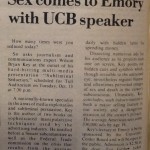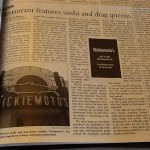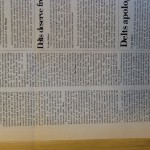People’s reactions to sexuality have been changing throughout our history drastically. Especially with new terms of sexual identity coming into play such as bisexuals, asexuals and transgenders. There are boundaries between the terms lesbian, bisexual, and unlabeled women, but these boundaries are “relatively fluid” [2]. Bisexuality has been labeled as a third type of sexual orientation. On the other hand, some researchers characterized asexuality as negative. [1] It’s not the norm. The confusion about sexual identity has always been apparent in America.
It seems like people who have different sexual identities have been facing discrimination even since the 1980s. In 1981, it seems people were not as open to homosexuals as shown during the “Homosexual Holocaust”. Homophobic violence used to be prevalent as people would throw eggs at gay people and their cars in gay bars. Homosexuals also had to deal with taunts and jeers from from passing motorists’ windows. Also the police would fail to respond promptly to calls in gay neighborhoods. In present day, just 31 years later, this type of behavior seems completely unacceptable to most Americans. It still may happen but not as frequently. Later on that year in 1981, Emory starts to acknowledge sex where Wilson Bryan Key speaks about “Subliminal Seduction. He dissects numerous ads while pointing out hidden cues and symbols, which show perverted images of sex and death. This changing notion of sexuality associated with negative things was slowly taking place.
But it seems now that people are opening up more to the idea of different categories of sexuality. In Berkeley, California on September 23, 2012 celebrated “Bisexual Pride and Bi Visibility Day”. This day was created to acknowledge bisexuals separately from gays and lesbians. Some Bisexual individuals claim they feel overlooked or misunderstood. Some feel they just get pushed to the side in the LGBT group. [3] Even Google is acknowledged bisexuals as they recently unlock the term ‘Bisexual’ from auto complete in Google search. In the past this word had been blocked from Google’s Auto Complete but after BiNet USA, a bisexual advocacy group, protected. This was a big step in terms of bisexuals gaining the respect of being accepted into society. [4]
In addition to bisexuals, transgenders also have been more accepted in society and are definitely well involved in the entertainment industry. In 2005, in the Emory Wheel a restaurant, Nickiemoto’s, was featured that has sushi and drag queens. Every Monday evenings, they have a drag queen performance where the performers took turns lip-syncing and erotically flirting with customers while singing the song “I Touch Myself”. The writer of that Emory Wheel article started that “frankly they were more beautiful than some female models I’ve seen…drag queens are an entertaining addition to a deliciously trendy meal”.
These changing views on sexual identity are making America a more acceptable place. Can every single person be open to these new sexual categories? No. But they are definitely becoming more a part of normal American society.
[1] Asexuality: Classification and Characterization by Nicole Prause and Cynthia A. Graham
[2] Female Bisexuality from Adolescence to Adulthood: Results from a 10-Year Longitudinal Study by Lisa M. Diamond
[3] http://www.huffingtonpost.com/2012/09/20/berkeley-bisexual-pride-day_n_1900566.html?utm_hp_ref=bisexual
[4] http://www.huffingtonpost.com/2012/09/11/google-bisexual-auto-complete-instant-search_n_1872252.html?utm_hp_ref=bisexual




Cheddar: “transgender people” is the preferred term (vs. “transgenders”). In your post you say “It seems like people who have different sexual identities have been facing discrimination even since the 1980s. In 1981, it seems people were not as open to homosexuals as shown during the “Homosexual Holocaust”. ” My questions are these: when you say “different sexual identities” who are they “different” from? What sources are you looking at that suggest gay discrimination or homophobia just started in the 1980’s? I would argue this type of discrimination has *always* been around, but may LGBT scholars mark 1969 as the beginning of the gay rights movement because this is when the Stonewall Riots began (see http://www.civilrights.org/archives/2009/06/449-stonewall.html). To be sure, there was plenty of resisting and even rioting before then, but this was so well publicized many folks use it as a starting point.
Secondly, what are you referring to when you talk about the “Homosexual Holocaust”? Do you mean the onset of the AIDS epidemic in the 80’s in the U.S.?
And I think you are making reference to some of the things you found in the archives. If so, please include photos of your findings in your post so that all readers can see what you have found.
Lastly, thanks for the outside research and the citations at the end of your post. Exactly what I am looking for.